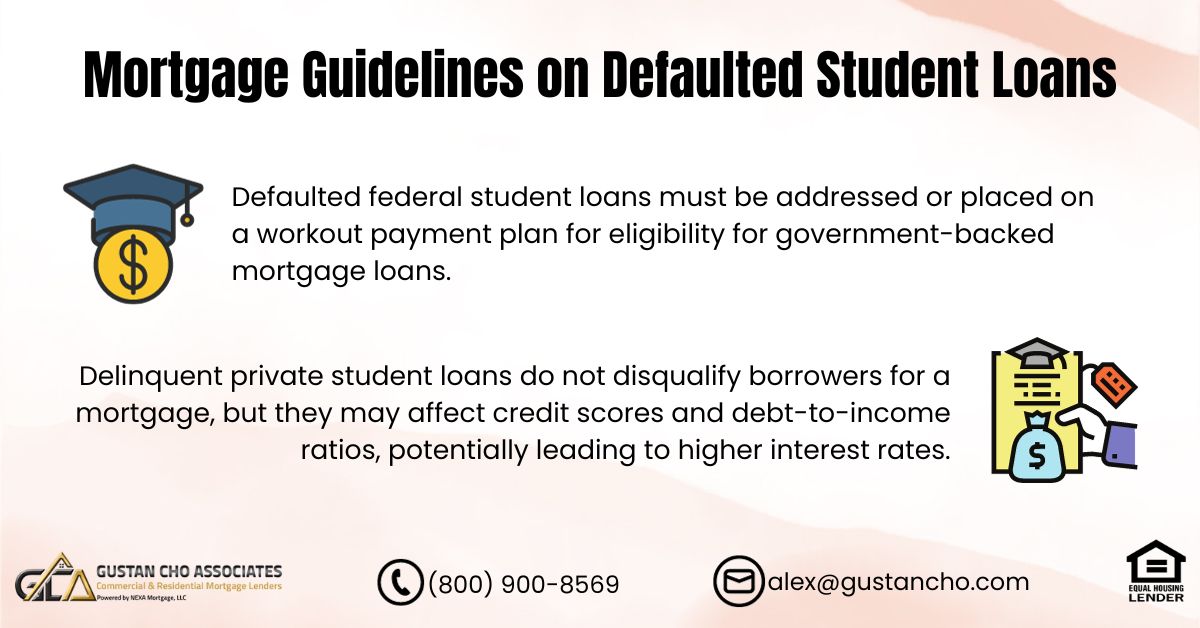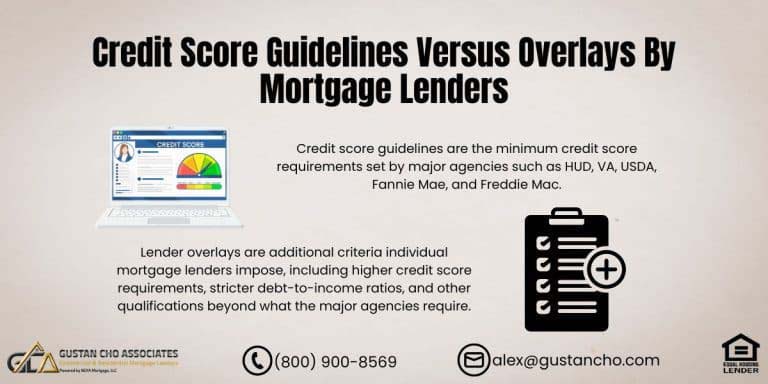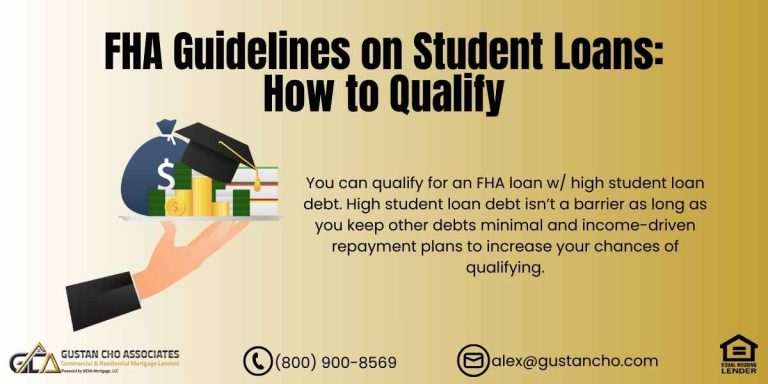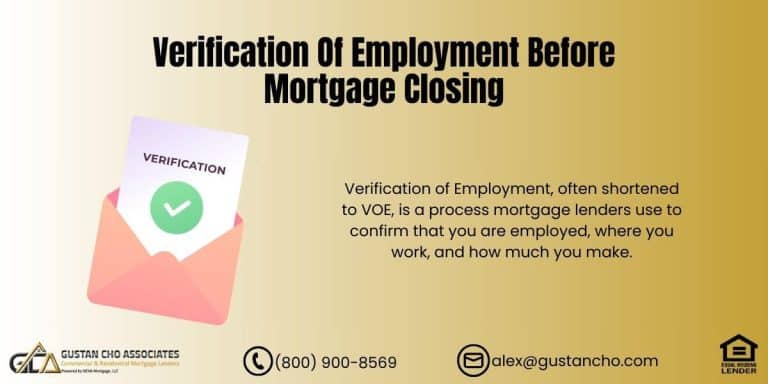In this article, we will discuss and cover mortgage agency guidelines on defaulted student loans. There are two types of student loans. Federal and private student loans. Federal student loans are student loans that have been guaranteed by the federal government. Federal student loans need to be paid.
Borrowers do not have to pay outstanding private student loans to qualify for a mortgage loan. However, all federal defaulted student loans need to be paid or in a workout payment plan for you to be eligible for a government-backed mortgage loan.
You cannot qualify for government-backed mortgage loans with delinquent student loans. HUD, the parent of FHA, has updated the cure of defaulted student loans for borrowers on FHA loans.
You can now expedite working out your federal student loan default in less than one month and qualify for an FHA loan. In this article, we will cover qualifying for FHA loans with defaulted student loans.
You Cannot Qualify For A Mortgage With Defaulted Student Loans
If your student loan enters collections, you will be ineligible for a government-backed mortgage loan, especially if you have defaulted on federal student loans. This restriction extends to government-backed home mortgages, such as FHA loans.
Private student loans function similarly to other installment loans. Unlike government student loans, private student loans can be discharged through bankruptcy. To be eligible for a mortgage, it is crucial to resolve the default status of federal student loans.
This article will delve into and elucidate the guidelines set by mortgage agencies concerning defaulted student loans.
Apply For Defaulted Student Loans, Click Here
Mortgage Agency Guidelines On Federal Versus Private Student Loans In Default
Annually, over one million Americans find themselves unable to meet their obligations on student loans, resulting in a significant impact on their credit scores and hindering their ability to purchase homes. When a student loan defaults, it is placed in collections by the creditor.
Federal student loans reach this status after 270 days of nonpayment, while private student loans face collection proceedings after 120 days without payment.
A representative from Gustan Cho Associates, highlighted the adverse consequences of defaulted student loans, emphasizing their detrimental effects on individuals’ financial well-being.
A student loan going into default can cause a borrower’s credit score to drop 60+ points. A steep drop in consumer credit scores will affect their ability to qualify for various programs as well as the most competitive interest rate possible.
To be eligible for a government-backed mortgage, a borrower must resolve any delinquency in their federal student loans. The federal student loan must be brought current through rehabilitation before the borrower becomes eligible for a government home mortgage.
Nevertheless, borrowers can still qualify for both government and conventional loans even if they have defaulted on private student loans.
Fannie Mae And Freddie Mac Guidelines on Student Loans In Default on Conventional Loans
Even if an applicant has federal or private student loans in default, they can still be eligible for a conventional loan as long as they possess a high credit score and a solid track record of timely payments. The only disqualifying factors permitted are delinquent federal and/or private student loans; no other factors will be considered.
The borrower will need to be able to provide an explanation regarding what steps they have taken to make the loan current. The debt will be counted towards the borrower’s debt-to-income ratio.
FHA borrowers can proceed as well with a private student loan in collections under the same circumstances. However, borrowers with outstanding federal student loans in default will not be able to qualify for FHA loans.
How Defaulted Student Loans Impact Qualifying For Government-Backed Mortgages
Individuals with federal student loans in default are ineligible for government-backed loans. Those facing defaulted student loans will not successfully pass the CAIVRS (Credit Alert Interactive Voice Response System) screening.
CAIVRS automatically identifies individuals with overdue federal debt. If an FHA borrower has a defaulted loan flagged on CAIVRS, they will be denied eligibility for a government-backed mortgage until the loan is brought out of default. There are three methods to resolve federal student loans in default: rehabilitation, consolidation, or settlement.
Contact For Defaulted Student Loans, Click Here
Student Loan Rehabilitation
Before the recent HUD update on defaulted student loans, the standard procedure for loan rehabilitation spanned nine months.
The typical process involved making nine consecutive income-based payments to your student loan servicer. These payments were designed to compensate for the previous nine missed payments that resulted in default, ultimately bringing the loan up to date.
After the nine payments are made your loan servicer will contact the credit bureaus to remove records of the loan being in default and you will regain the ability to forebear your loan, modify payment plans, and qualify for forgiveness.
Rehabilitation is a lengthy procedure aimed at recovering your loans from default, yet it is likely to result in a significant improvement in your credit score by eliminating the default record from your credit report.
The positive development is that HUD has streamlined the rehabilitation of defaulted student loans, condensing the process into a thirty-day workout period.
Consolidating Your Student Loans That Are Defaulted
The next option is to consolidate your student loans with a direct consolidation loan. In order to qualify for consolidation, you must have at least one loan that hasn’t previously been consolidated.
You must agree to pay the future consolidated loan on an income-based repayment plan or make 3 full monthly payments prior to consolidation. This process will allow borrowers to qualify for forbearance, forgiveness, and eventual payment modifications.
The record of having defaulted will stay on their credit report which may continue to affect their credit score until it is removed in 7 years. The process of consolidation takes about 30-90 days making it at worst 3 times faster than loan rehabilitation.
Paying The Defaulted Student Loans In Full
The third option is to pay the defaulted loan in full or negotiate a settlement with your servicer. Settlements with student loan servicers are typically 80%-90% of the loan’s remaining balance and would be paid within 90 days of the approval from the servicer.
Private Defaulted Student Loans
In the case of defaulting on a private student loan, borrowers have the option to apply for a mortgage, unlike those with defaulted government student loans.
However, the impact on their credit score and debt-to-income ratio will pose challenges in qualifying for the mortgage, potentially leading to an increased interest rate on the loan.
Private lenders do not have to offer the same programs to get your loans out of default, but borrowers still have similar options. The most effective options are to refinance or negotiate a settlement.
By refinancing the borrower may get a lower monthly payment and will have closed the collection account which will eventually improve their credit.
Refinancing differs from federal student loan consolidation in that it does not remove the record of default from credit history. Nevertheless, over time, a closed collection account will have a lesser impact on credit.
Opting for settlement releases the borrower from the debt obligation and, ultimately, enhances the borrower’s credit. In the case of defaulted private student loans, the loan provider may charge them off. Conversely, federal student loans cannot be charged off.
Aprove For Private Defaulted Student Loans, Click Here
Mortgage Guidelines on Defaulted Student Loans
In the upcoming paragraphs, we will explore and address the guidelines related to student loans in the context of purchasing and refinancing mortgages. The specific guidelines for student loans on purchase and refinance mortgages vary depending on the individual loan program.
Student loan debt stands out as a significant obstacle and challenge for individuals looking to buy homes, particularly impacting professionals with advanced degrees such as doctors, dentists, lawyers, and educators.
The guidelines for USDA student loans mirror those of FHA, while VA loans have their own set of guidelines for student loans. Fannie Mae and/or Freddie Mac guidelines permit Income-Based Repayment (IBR) on student loans.
HUD Student Loans Guidelines On FHA Loans
The Department of Housing and Urban Development (HUD), the overseeing body for the Federal Housing Administration (FHA), has recently approved the inclusion of Income-Based Repayment plans (commonly known as IBR) for FHA loans.
It’s worth noting that the United States Department of Agriculture (USDA) shares identical student loan guidelines with FHA loans. Consequently, the student loan criteria outlined for FHA loans are equally applicable to USDA Loans.
Notably, there has been a relaxation in the student loan guidelines for FHA loans. Borrowers can now consider 0.50% of the outstanding student loan balance as a hypothetical monthly student loan debt, especially applicable to those with deferred student loans or individuals unaware of their monthly fully amortized loan payments.
However, it’s important to highlight that HUD still prohibits the use of IBR Payments in this context.
HUD does not exempt deferred student loans that are deferred longer than 12 months from being used for debt-to-income ratio calculations on FHA loans. You need to use 0.50% of the outstanding loan balance as a hypothetical debt when calculating debt-to-income ratio on FHA loans.
This holds true even though borrowers’ student loans are deferred for longer than 12 months.
Consumers with a permanently fixed student loan payment that has been fully amortized can be used as a monthly debt for DTI Calculations. Lenders need to have proper documentation to verify that monthly payments are fixed and amortized. Both interest rates and the repayment term of the outstanding student loan need to be fixed.
Deferred And NON-FIXED Student Loan Payments
HUD does not allow non-fixed student loan payments. Below are examples of non-fixed student loan payments:
- Deferred student loans
- Income-Based Repayment
- Graduated student loans
- Adjustable student loans
- Other types of repayment agreements that are not fixed
- All the above non-fixed student loan payments cannot be used on USDA and FHA loans
0.50 percent of the loan balance reflected on the credit report must be used as the hypothetical monthly payment. No additional documentation is required if the above 0.50% is used as the borrower’s hypothetical monthly payment.
There are tricks of the trade we can discuss over the phone. We do have alternative hypothetical monthly payments other than the 1.0% rule. Please contact us at Gustan Cho Associates at 800-900-8569 or text us for a faster response. Or email us at alex@gustancho.com.
Apply For Defaulted Student Loans, Click Here
VA Student Loans Guidelines
VA loans are the only loan program that permits deferred student loans that have been deferred longer than 12 months exempt from DTI Calculations.
Per VA student loan guidelines, the mortgage can exclude deferred student loans that are deferred longer than 12 months from the DTI of borrowers. VA does not allow Income-Based Repayment Plans. Here is how non-deferred student loans are calculated on VA loans:
- Take 5% of the outstanding student loan balance that is reported on the consumer credit report.
- Divide by 12 months.
- The resulting figure will be the hypothetical monthly payment on VA loans
Getting Hypothetical Student Loan Payment From Student Loan Provider
If the payment amount reported on the consumer credit report is less than the threshold payment above, the borrower needs to do the following:
- Obtain a statement from the student loan provider
- The statement needs to state the loan terms and payment for each student loan
- The statement needs to be dated within 60 days of the closing of the VA loan
- Lenders may do a credit supplement on this
IBR Payments on Student Loans Are Allowed on Conventional Loans
Fannie Mae permits Income-Based Repayment on Conventional loans. It can also be a zero IBR Payment and Fannie Mae will allow it. If there is a monthly payment reflected on the consumer credit report, then that payment can be used as the actual monthly payment.
HUD, the parent of FHA, now allows Income-Based Repayment (IBR Payments) on FHA loans. Homebuyers with large outstanding student loans on income-based repayment can now qualify for FHA loans.
If the IBR payment is not reported on the consumer credit report, then the borrower needs to get an IBR statement from the student loan provider. The lender may do a credit supplement of the IBR Payment so it reflects on the borrower’s credit report.
Qualifying For A Mortgage With IBR Payments on Student Loans
If the consumer credit report doesn’t provide a monthly figure or reflects zero, the lender needs to confirm the IBR Payment as follows. If a mortgage borrower is on an IBR Plan, the borrower needs to provide a written statement from the student loan provider stating the borrower has a zero IBR Payment.
Mortgage Underwriters can qualify borrowers with zero IBR Payments with Fannie Mae. Freddie Mac does not allow zero IBR Payments.
Hypothetical Versus Fully Amortized Monthly Payments Over Extended Term
0.50% of the outstanding student loan balance is used for deferred outstanding student loans OR the borrower can contact the student loan provider and get a fully amortized monthly payment on an extended term. This needs to be in writing.
Gustan Cho Associates are experts in working and qualifying borrowers with high outstanding student loans and high debt-to-income ratios.
Please get in touch with us with any questions at 800-900-8569 or text us for a faster response. Or email us at gcho@gustancho.com. The team at Gustan Cho Associates is available 7 days a week, on evenings, weekends, and holidays.
FAQ: Mortgage Agency Guidelines on Defaulted Student Loans
- How do federal student loans differ from private student loans regarding mortgage eligibility? Borrowers do not need to pay outstanding private student loans to qualify for a mortgage loan, but they must address any defaults on federal student loans to be eligible for government-backed mortgage loans.
- Can I qualify for government-backed mortgage loans with delinquent student loans? No, you cannot qualify for government-backed mortgage loans if you have delinquent or defaulted federal student loans. You must address the default status through rehabilitation, consolidation, or settlement.
- How has the HUD updated the process of rehabilitating defaulted federal student loans for FHA borrowers? HUD has streamlined the rehabilitation process, reducing it from nine months to a thirty-day workout period, making it faster and more accessible for FHA borrowers.
- What options do borrowers with defaulted federal student loans have for resolving their defaults? Borrowers can choose from three options: rehabilitation, consolidation, or settling the defaulted loan in full. Each option has its requirements and implications for credit.
- Can borrowers with defaulted private student loans still apply for a mortgage? Yes, borrowers with defaulted private student loans can apply for a mortgage, but it may affect their credit score and debt-to-income ratio, potentially leading to higher interest rates.
- What are the guidelines for student loans on conventional loans by Fannie Mae and Freddie Mac? Fannie Mae and Freddie Mac allow borrowers with federal or private student loans in default to be eligible for conventional loans if they have a high credit score and a history of timely payments. Delinquent student loans may be included in the borrower’s debt-to-income ratio.
- What are the guidelines for student loans on VA loans? VA loans are unique because they allow borrowers to exclude deferred student loans (deferred for longer than 12 months) from debt-to-income ratio calculations. VA does not permit using Income-Based Repayment (IBR) plans for student loans.
- Can Income-Based Repayment (IBR) plans be used for conventional loans? Yes, Fannie Mae permits the use of IBR on conventional loans, even allowing for zero IBR payments if reflected on the consumer credit report.
- What is the impact of HUD’s recent changes regarding Income-Based Repayment (IBR) plans on FHA loans? HUD now allows FHA borrowers to consider 0.50% of the outstanding student loan balance as a hypothetical monthly student loan debt, especially for those with deferred student loans or unknown monthly amortized payments. However, IBR payments cannot be used in this context.
- What types of student loan payments are not allowed for USDA and FHA loans? HUD does not allow non-fixed student loan payments, including deferred student loans, Income-Based Repayment (IBR), graduated student loans, adjustable student loans, or other non-fixed repayment agreements for USDA and FHA loans.
- How can borrowers with no monthly figure or zero IBR payments confirm their payment for mortgage qualification? Borrowers without a monthly figure or with zero IBR payments can provide a written statement from their student loan provider confirming the zero IBR payment. Fannie Mae allows zero IBR payments, but Freddie Mac does not.
Apply For Defaulted Student Loans, Even in Holidays and Weekends
This article about Mortgage Guidelines on Defaulted Student Loans was updated on February 2nd, 2024.












